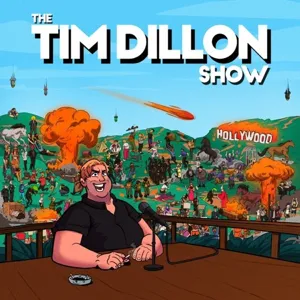Podcast Summary
Why Commercial Properties Remain Vacant in Housing Crises: Zoning laws and capitalistic market forces contribute to the persistence of empty commercial properties in areas with a housing crisis.
Despite a housing shortage and high rental prices, commercial properties often remain vacant while residential spaces are in demand. Julia, from Santa Rosa, California, asked why this is the case. While it may seem like a simple problem, the answer is complex. Zoning laws and capitalistic market forces are likely contributing factors. As we delve deeper into this topic, we aim to provide a clearer understanding of why empty commercial properties persist in areas with a housing crisis. Additionally, during our discussion, we touched on the importance of investing in our pets' health. The Farmer's Dog offers a fresh, healthy dog food option that can lead to numerous benefits for dogs at all life stages. By providing them with real food, you can improve their overall health and happiness, allowing you to enjoy more quality time together. So, whether you're a dog owner looking for the best food for your furry friend or someone pondering the mystery of empty commercial properties, we've got you covered. Stay tuned as we explore the intricacies of this issue and share valuable insights.
An aura frame is a great Mother's Day gift for displaying cherished memories: An aura frame, named as the best digital photo frame by Wirecutter and Oprah, is a thoughtful Mother's Day gift that offers a meaningful way to display cherished memories with a current deal for $30 off and free shipping using a code at checkout.
When it comes to finding the perfect Mother's Day gift, an aura frame is a safe bet for bringing joy to moms of all ages. Named as the best digital photo frame by Wirecutter and selected as one of Oprah's favorite things, these frames offer a meaningful way to display cherished memories. Aura is currently offering a deal for Mother's Day, allowing listeners to save $30 and receive free shipping on their best-selling frame by using the code at checkout. Meanwhile, the topic of why an office building can't easily be converted into an apartment is a complex issue with various challenges. Zoning regulations, the nature of the buildings themselves, and the objections of local residents all contribute to the difficulty. Bill Fulton, a man with extensive experience in zoning and urban planning, explained that zoning originated from the need to separate potentially hazardous factories from residential areas over a century ago. However, it also had classist and racist undertones, with affluent individuals using zoning to separate themselves from apartment buildings. Understanding the history of zoning provides insight into the root causes of the housing shortage.
Zoning laws have a complex history of exclusion: Historically, zoning laws have been used to exclude certain groups based on race and income, but they can also ensure decent living conditions and maintain community character.
Zoning laws, which were initially intended to make cities more livable by regulating building construction and land use, have also been used historically to exclude certain groups of people. The earliest zoning laws in the U.S., such as the one in Los Angeles that banned laundries from white neighborhoods, were driven by racial biases. Later, zoning for single-family homes became a tool to keep out poor people and people of color. Today, cities are grappling with the complex legacy of these zoning laws, as they strive to make housing more affordable and inclusive while respecting neighborhood character. The debate between NIMBYs (Not In My Back Yard) and YIMBYs (Yes In My Back Yard) reflects the ongoing tension between these competing priorities. While zoning regulations can help ensure decent living conditions and maintain community character, they can also be exclusionary and drive up housing costs. Understanding this history can help inform more equitable and effective zoning policies in the future.
Houston's lack of zoning laws leads to diverse housing production: Houston's absence of zoning laws allows for varied housing types and increased production, but faces challenges with large office-to-residential conversions.
The absence of zoning laws in Houston, Texas, results in developers dictating what gets built, leading to a mix of housing types and increased housing production. However, this comes with its own challenges, such as the conversion of large office spaces into residential units being more complicated than expected due to their size and construction. This trend of loosening zoning regulations or adopting more flexible zoning policies may spread to other cities as they grapple with housing shortages and reconsider the socially undesirable aspects of strict zoning. Ultimately, the debate between NIMBYs and YIMBYs highlights the complexities and trade-offs involved in urban planning and housing development.
Redeveloping malls into housing: Malls, with their large contiguous land ownership in desirable areas, are being transformed into residential spaces to address housing shortages. This involves tearing down old mall structures and constructing new housing units.
The conversion of large commercial spaces like offices and malls into residential units is a promising solution to the housing shortage in many cities. While converting large office buildings into apartments can be challenging due to the lack of natural light and the vast interior space, old malls offer more potential. These properties often have the largest contiguous land ownership in desirable areas and are increasingly being redeveloped into housing. The process usually involves tearing down the mall building and constructing new residential structures, although some conversions are possible. The adaptive reuse of malls into housing is a fascinating and versatile way to live, although it may require some compromises for those living in the smaller, efficiency-style units. The trend of repurposing commercial spaces into residential areas reflects the evolving needs of cities and the importance of adaptability in urban development.
Transforming Commercial Spaces into Residential: The Biggest Obstacle is People: Despite the predicted reduction in malls post-COVID, resistance from people remains the biggest challenge in transforming commercial spaces into residential areas. Local government officials like Raisa Dela Rosa work to address these issues and remain optimistic about the potential for efficient problem-solving.
The transformation of commercial spaces into residential ones faces significant challenges, particularly due to resistance from people. Bill Fulton predicts that after the post-COVID shakeout, around 300 malls in America will remain, providing more room for housing. However, Raisa Dela Rosa, the Division Director for Economic Development in Santa Rosa, emphasizes that people are the biggest obstacle to change. Raisa, who has a unique perspective from her background in the arts and her long-standing career in local government, spends her days addressing such issues. Despite the challenges, Raisa remains optimistic and believes in the power of efficient problem-solving. The conversation also touched on the importance of being prepared for unexpected vet bills with Spot Pet Insurance and the versatile and comfortable clothing offered by Vuori.
Transforming vacant properties into new housing in Santa Rosa: Despite city efforts, converting vacant properties into new housing faces challenges from financing, property ownership, and neighbor opposition, making it a lengthy and complex process.
The process of converting vacant properties into new housing in Santa Rosa faces numerous challenges. While there is a strong will from the city government to make a change, it's a complex and lengthy process. Financing, property ownership incentives, and opposition from neighbors are significant obstacles. For instance, property owners might not want to lease out a building if they have no debt on it, or if the conversion would be expensive. Neighbors, particularly those with a short-term perspective, can also pose a significant challenge due to fears and misconceptions about who might move into new developments. These challenges, coupled with the complexity and scale of real estate development, make it a slow and arduous process.
Addressing the housing crisis in NY requires a comprehensive approach: Protect and update existing housing, build new housing, and involve suburbs in the solution to make housing affordable for all generations in NY
The housing crisis in areas like New York requires a comprehensive approach to address the issue. Older homeowners, often resistant to change, will eventually pass on, and the demographic reality is shifting towards a younger population struggling to afford housing. The YIMBY (Yes In My Backyard) movement is a response to this, advocating for more housing development to meet the needs of the growing population. However, convincing homeowners to change their minds about development in their neighborhoods can be challenging. Instead, the political dynamic is changing due to demographic shifts. It's essential to protect and update existing housing while building new housing wherever possible. Suburbs must also contribute their fair share to the solution. If we don't take a comprehensive approach, young people and future generations may not be able to afford to live in these areas. The issue is not just about preventing new development but also about ensuring that existing and new housing is affordable for all.
Addressing the housing crisis: A multifaceted approach and embracing change: To solve the housing crisis, we need to convert office buildings into apartments, tear down old malls, and allow denser housing developments over the next decade. Change is necessary but faces resistance and implementation challenges.
Finding solutions to complex issues like the housing crisis requires a multifaceted approach and embracing change. Bill Fulton, a former bureaucrat, emphasizes that the United States has been underproducing housing for 30 years, leading to high housing costs in desirable areas. He suggests that over the next decade, various solutions such as converting office buildings into apartments, tearing down old malls, and allowing denser housing developments will be necessary. The resistance to change and the difficulty of implementing these solutions are significant barriers, but eventually, they will likely become a reality. As for the Internet, the favorite thing this week is a video of a bear in a Chinese zoo wearing a bear suit that doesn't seem to fit well. The initial assumption was that it wasn't a bear, but rather a dog or another animal in a costume. However, it turned out to be a real bear, highlighting the power of social media and the importance of fact-checking information.
Zoo's Unusual Response to Bear Costume Controversy: A Chinese zoo wrote a letter from a bear's perspective denying being a human in a costume, generating more attendance and publicity.
The controversy over a video of a supposed bear at a Chinese zoo led to an unconventional response from the zoo, which wrote a letter from the bear's perspective denying being a human in a costume. The letter emphasized that the bear, named Angela, is a Malayan sun bear and not a dog or human. The zoo's unusual approach to the controversy may have even generated more attendance to the zoo, making it a brilliant PR move. The letter was translated by the New York Times for those who don't read Chinese or speak bear. The podcast "Search Engine" discussed this incident, and the creators believe it was a deliberate move to increase publicity and subscriptions to their newsletter.






